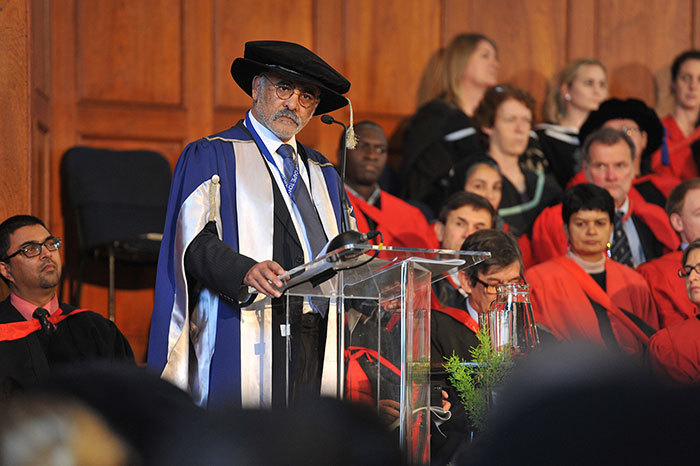We're in a moment like 1976, says Soudien
12 June 2015 | Story by Newsroom
As engineering and health sciences graduands began their academic journeys on 11 June 2015, UCT bade farewell to one of its stalwart scholars. Professor Crain Soudien, the outgoing deputy vice-chancellor, used his keynote speech at Thursday afternoon's graduation ceremony to urge the young academics to imagine what it means to be a society that has moved past not just race, but all markers of power imbalances and inequality.
The 1970s and the now
Soudien reminded the graduands of the "tumultuous times" in South Africa during the 1970s, when he was an undergraduate student at UCT.
"The heavy hand of the apartheid government was everywhere – physically in the streets, and encroachingly in our heads."
Then on 16 June 1976, the students in Soweto took to the streets. That experience "left us disorientated". Feelings of anxiety permeated questions of whether to join the student protests. The image of young people, stones in hand, standing defiantly across the roads of our country facing heavily armed police was inescapable.
"Raging impatience was everywhere. Right now, we're going through another moment of disorientation," he said, referring to the reinvigorated debate about transformation that the Rhodes Must Fall movement sparked earlier this year.
Soudien, who has been at the university for some forty years and holds joint professorships in education and African studies, will take up the directorship of the Human Sciences Research Council on 1 September.
'Race' is an invention
In his student days, Soudien counted himself fortunate to have learned the nuances of the politics of the day from a range of intellectuals that "you will not find ... in standard history texts".
These "interlocutors" were people like Isaac Tabata, Ben Kies, Dullah Omar, and Neville Alexander, some of whom taught at the university, some at high schools like Harold Cressy, Livingstone and South Peninsula, and from organisations like the Non-European Unity Movement and the African National Congress.
It was during their time at UCT that Soudien and his peers crowded 'Freedom Square' – the grass verge outside the Arts Block – to listen to those luminaries debate issues of race, politics and power with academics like Mary Simons, Colin Bundy and Martin Legassick.
And it was in that golden moment in the university's history, Soudien related, that the interlocutors passed on a fundamental lesson: "All of us, every single one of us, were people of unconditional dignity and worth. They explained, drawing on the best thinking in biology and science – and I'm very glad we have health sciences students here – and the very best of sociology, that the idea of 'race' was an invention."
Tabata and company made it clear how problematic the idea of owing greater loyalty to those who look like us, only because they look like us, was. Hearing that, no longer did Soudien et al "need to think with our skins".
The question for today's students, then: does UCT continue to provide interlocutors, sense-makers, during this moment?
University's interlocutory mission
For Soudien, it's unacceptable that the social character of a society can be unproblematically reproduced in the university.
"These are issues we struggle with at UCT," he said, referring to how the university grappled with funding challenges, market pressures and conservative traditions.
This university – and indeed its peers – was deeply conscious of its interlocutory position and was now working out what it means to be a post-apartheid university, and what it means to be a society that has "progressed beyond not just race, but all the debilitating inequalities that surround us".
All of its faculties were duty-bound to help South African society understand what it meant to be a human being in 2015, he argued.
"This work is about whiteness, blackness, femininity, masculinity, violence; it's about want, fracking, sustainable energy; it's about spatial inequality, drug discovery; it's about the rights of ordinary people living under the aegis of traditional law."
Moments before the heirs of this mission were capped, Soudien's fellow DVC Professor Sandra Klopper shared a final thought.
"I must say, as I heard you speak, I thought, why are you leaving us? You should be staying and helping us continue to do the work we're doing, the work of relevance, of creating intellectual spaces for debate," said Klopper.
Story by Yusuf Omar. Photo by Michael Hammond.
 This work is licensed under a Creative Commons Attribution-NoDerivatives 4.0 International License.
This work is licensed under a Creative Commons Attribution-NoDerivatives 4.0 International License.
Please view the republishing articles page for more information.










